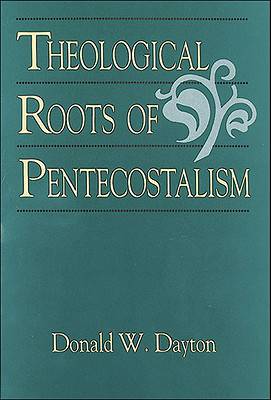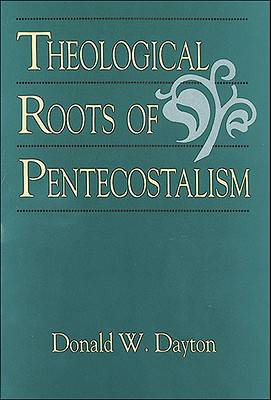
Door een staking bij bpost kan je online bestelling op dit moment iets langer onderweg zijn dan voorzien. Dringend iets nodig? Onze winkels ontvangen jou met open armen!
- Afhalen na 1 uur in een winkel met voorraad
- Gratis thuislevering in België vanaf € 30
- Ruim aanbod met 7 miljoen producten
Door een staking bij bpost kan je online bestelling op dit moment iets langer onderweg zijn dan voorzien. Dringend iets nodig? Onze winkels ontvangen jou met open armen!
- Afhalen na 1 uur in een winkel met voorraad
- Gratis thuislevering in België vanaf € 30
- Ruim aanbod met 7 miljoen producten
Zoeken
Omschrijving
Pentecostalism is one of the most dynamic forces in twentieth-century Christianity. From fast-growing denominations such as the Assemblies of God to popular television ministries such as "The 700 Club," the fruits of Pentecostalism can be seen throughout modern Christian life.
In this landmark study, Donald Dayton explains how Pentecostalism grew out of Methodism and the nineteenth-century holiness revivals. He finds evidence of Wesleyan teaching in the classic writings of many Pentecostal leaders. He shows how Pentecostalism is rooted in the Wesleyan theological tradition, rather than being a contrived system of modern revivalistic ides. Martin E. Marty says in his foreword that Pentecostals "have no choice, it is clear from this book, but to see that there were . . . roots to the growth they reaped." He calls Theological Roots of Pentecostalism "a very important statement . . . one without which subsequent commentators on Pentecostalism are not likely to give intelligent accounts."
In this landmark study, Donald Dayton explains how Pentecostalism grew out of Methodism and the nineteenth-century holiness revivals. He finds evidence of Wesleyan teaching in the classic writings of many Pentecostal leaders. He shows how Pentecostalism is rooted in the Wesleyan theological tradition, rather than being a contrived system of modern revivalistic ides. Martin E. Marty says in his foreword that Pentecostals "have no choice, it is clear from this book, but to see that there were . . . roots to the growth they reaped." He calls Theological Roots of Pentecostalism "a very important statement . . . one without which subsequent commentators on Pentecostalism are not likely to give intelligent accounts."
Specificaties
Betrokkenen
- Auteur(s):
- Uitgeverij:
Inhoud
- Aantal bladzijden:
- 204
- Taal:
- Engels
Eigenschappen
- Productcode (EAN):
- 9780801046049
- Verschijningsdatum:
- 1/09/1987
- Uitvoering:
- Paperback
- Formaat:
- Trade paperback (VS)
- Afmetingen:
- 140 mm x 201 mm
- Gewicht:
- 249 g

Alleen bij Standaard Boekhandel
+ 90 punten op je klantenkaart van Standaard Boekhandel
Beoordelingen
We publiceren alleen reviews die voldoen aan de voorwaarden voor reviews. Bekijk onze voorwaarden voor reviews.











